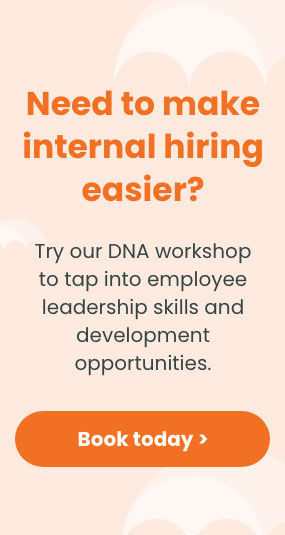Recruitment is always a bit of an arduous task for any organisation. The mountains of applicant CVs, intense recruitment strategies and booked-solid interview schedules are reasons for anyone to want to hire someone as quickly as possible. However, a bad hire for a role can have detrimental effects on your organisation, so rushing the recruitment process is never good for the employee or the employer. Massive amounts of care should be taken when going through the process of recruitment and hiring a new employee to make sure the wrong person isn't hired for the job - otherwise, the cost of a bad hire can be severe. Here are some tips to ensure you recruit well and don't make a bad hire anytime soon.
How hiring the wrong person can affect your organisation
Lower Company Morale
A bad hire can be particularly detrimental to an employer's brand, work culture and morale. If there is a bad employee who isn't pulling their weight or doesn't fit in well with the company culture, then other employees in the organisation will be taking on extra work (emotional as well as practical) to make up for where that employee is lacking. This significantly decreases the overall productivity of a team and can lead to good employees feeling stretched to their limits. Lower productivity and burnout could result in some of the most dedicated people and workers leaving the company for other options. Hiring the right employee for the job by having a good hiring strategy is essential for maintaining a good office culture, keeping everyone happy and making sure productivity is on the rise.
Damaged Reputation
Recruiting the wrong employee for the job can also be damaging to an organisation's reputation and employer brand. If this new hire is working with clients directly (or even indirectly) and isn't living up to the company's standards, then those clients may search for alternative organisations to work with in the future. Being confident that the hire is the right person during recruitment is key to ensuring client retention and satisfaction.
How to Avoid Making a Bad Hire
Don't rush the process
The biggest factor in avoiding bad hire decisions is ensuring that recruitment isn't rushed. It takes time and energy to recruit an ideal candidate and is not something that can be decided too quickly. When beginning the recruitment process and deciding on a recruitment strategy, the employer should make sure that enough time is allotted to get to know the potential candidates well and see if these people have the right skills, attitudes and backgrounds for the job. Through a thorough hiring process with a good amount of time and care, the ideal employee will reveal themselves as everything unfolds, making the hiring decisions much easier.
Structure your strategy
Another important aspect of a recruitment strategy is having consistency and structure within your interview process. Asking all potential candidates the same questions and having them take the same, role-specific skills tests (such as the ones we have at Skillsarena) is the best way to decide between applicants and assess their hard skills.
Having a detailed job description and specific job title will also outline the skills and experience needed for the job and will give the employer something to refer back to to accurately measure a potential employee's fit for the role. This will help attract the right applicants and show them what to prepare for and highlight in their own interviews. Our realistic job previews are an effective tool for attracting candidates who feel like they align with the role. Important factors such as a salary range and a list of day-to-day responsibilities will leave candidates feeling prepared and informed, which will ultimately make recruitment an easier and smoother process for interviewees and employers alike. Even once they have hired a candidate, companies shouldn't forget to implement a probationary period. This time will allow managers to validate the employee's skills and evaluate other performance factors, ultimately determining whether the hire has been a success.
Ask the right questions
Asking the right questions in your recruitment strategy is also a great way to ensure that the top talent is getting the job offer. Questions should not just centre around the skills the roles require, but also how that potential employee reacts to or handles situations that are more stressful or difficult. Having candidates take a situational judgement test can help gauge a sense of their workplace demeanour and how they deal with problems that arise. Whether the job is an entry-level, mid-management or even senior-level position, having a strategy to ask questions that reveal how the person responds under pressure is a great way to see if they'd be a good cultural fit for the employer. This will also help reveal any red flags that a potential employee may not be the best fit for the job. Interrogating possible employees in recruitment is not the goal, but it is beneficial to have a sense of who they are in a work setting and how they choose to relate to those around them. Asking a recruit the right questions can help you see who they are outside of an interview context.
Look in a range of places
One mistake recruiters often make when posting job openings is only having a job post on one site or in one place. Placing job adverts through multiple media and on different kinds of job sites is a great way to expand your talent pool.
Social media is also a great out-of-the-box tool for posting job ads, as they can easily be shared and job seekers can be tagged by those who know them well. By connecting the right possible employees to your job advert quickly and easily, social media makes the hiring process a lot smoother for recruiters and decreases the chances of making a hiring mistake.
Avoid biases
Some companies who have a hard time with recruitment and finding the right employee for the job posting are actually stunted by implicit biases that may still exist within them, whether they know it or not. It is important that employers consider people from all areas of life in order to find the perfect person for the job, but all too often, recruiters automatically write off certain candidates based on extraneous attributes. Oftentimes this happens unconsciously, so it is important for recruiters to take steps to address these biases towards people. (Read more in our blog on how skills tests reduce unconscious bias.)
If there is unconscious bias present in the recruitment team, then a whole range of candidates who have the potential to be perfect employees will not be considered, thereby increasing the chances of a hiring mistake. Employers should address their own teams to see where their implicit biases lie and correct these in their hire process and strategy.
Don't hire on skills alone
The last factor to consider in a successful recruitment strategy is what the determining factors that will lead to hiring someone are. Many companies these days will prioritise soft skills and attitude over any hard skills a candidate may have. This is because maintaining a healthy company culture is important, so hiring someone who is a good communicator and fits in well with the team is going to be more beneficial in the long run than someone who may have all the necessary skills but doesn't fit with the organisation or is difficult to work with.
Looking at these factors is a good way to make sure that the person being hired is good for the job all-round and will decrease the likelihood of a hiring mistake being made. Consider having candidates take personality tests to see if they would be a good fit for the team - the results of these psychometric tests can also be a useful source of information for the interview panel.
A bad hire can be costly. It wastes time, resources and money and also affects an entire team of employees if the new hire is not a good fit for the job. At Skillsarena, we are here to help.
If your organisation is recruiting for roles and would like to build a more successful hiring strategy, then take a look at our offering to take the next steps towards employing the right people. Explore our range of skills tests and personality profiles as well as our realistic job previews and situational judgement tests to avoid making a bad hire when you next advertise an opening!




